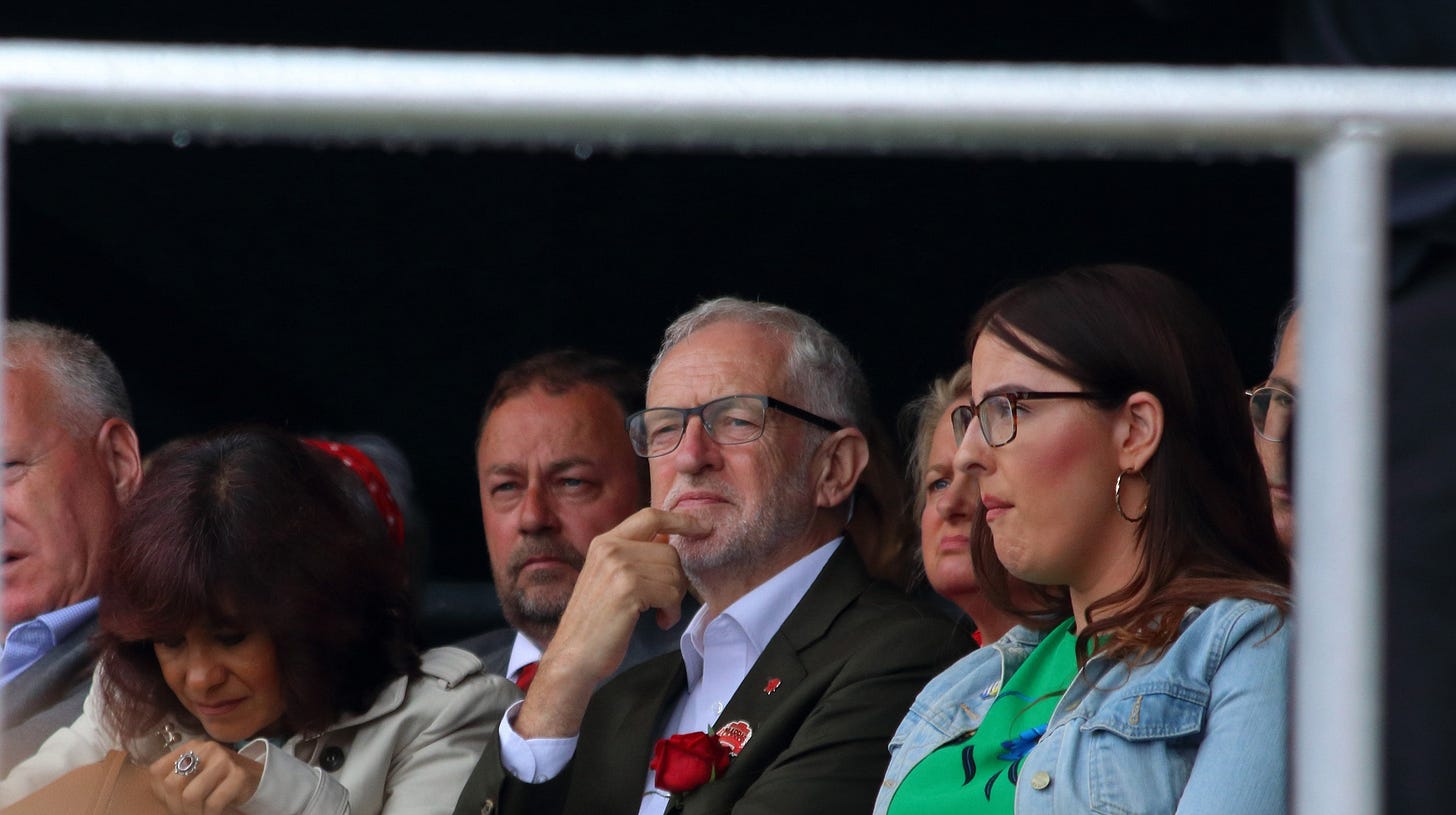Welcome to the 19th instalment of the Liberal Digest. Another political party, founded by Jeremy Corbyn and Zarah Sultana looks set to splinter Britain’s electorate even further by appealing to the populist left. It follows Rachel Reeves’ slapping down of calls to levy a wealth tax, and pleas from Labour MPs for the Government to focus resolutely on getting more done. Meanwhile, protests outside of a hotel housing asylum seekers – in part whipped up by neo-Nazis – continued for another night.
In this week’s edition: going for growth, locking in the triple-lock, debt dilemmas and the meaning of profit.
Did we miss something? Let us know.
Stop the Press!
Best op eds, interviews, news and analysis of the week in the old-school media
The Guardian writes up the launch of Corbyn and Sultana’s new outfit, albeit with little clarity on what to call it:
“The new movement has yet to be named but has an interim website under the moniker of Your party. In a statement on X, the two former Labour MPs appealed described it as “a new kind of political party, one that belongs to you”. “The system is rigged when 4.5 million children live in poverty in the sixth-richest country in the world,” it said. “The system is rigged when giant corporations make a fortune from rising bills. The system is rigged when the government says there is no money for the poor, but billions for war. We cannot accept these injustices, and neither should you.””
The Labour Growth Group issued a call to action, urging the Government to do more to confront Britain’s problems:
“The dysfunction gripping Britain is not an unavoidable tragedy. It stems from a clear political failure and a catastrophic absence of moral courage. Our founding principle is that decline is neither inevitable nor acceptable; Britain’s best days are ahead, but only if we choose purpose over complacency and disruption over caution. For too long politicians were content to accept the things they could not change, we instead set out to change those things which we cannot accept. We must smash the status quo.”
An overhaul of Britain’s pension system was announced, but Torsten Bell, the Minister responsible, said changes to the triple lock were off the table:
“The so-called triple lock on the state pension, which provides that it rises by the greatest of earnings, inflation and 2.5 per cent, was “not in scope” for the commission, said Bell. Labour vowed to protect the triple lock during this parliament in its election manifesto.”
Rachel Reeves ruled out introducing a wealth tax, citing their poor track record when adopted by other countries:
“Eight nations have introduced wealth taxes only to subsequently scrap them: Austria, Denmark, Germany, Finland, Iceland, Luxembourg, Sweden and France. Today, just four countries retain wealth taxes: Norway, Spain, Switzerland and Colombia. Reeves is already facing significant pressure over plans to reform the non-dom tax regime. Research by New World Wealth, an intelligence firm, recently suggested that Britain has lost 18 billionaires over the past two years, more than any other country in the world.”
Rachel Wolf gets to the heart of the problem explaining why we don’t build enough houses:
“Why has housing collapsed? Because we have created a system built on veto power and split the benefits of new homes from the costs. Councillors frequently delay or block new housing developments, and often have voters who strongly wish them to do so. There are few compensations to the council for saying yes. Payments by the developer to the council are rarely enough for the council to afford new schemes, while stamp duty goes entirely to the Treasury. Dense housing creates agglomeration and growth, and central government reaps the gains of those. Most of the taxes local businesses pay go to the Treasury. So there is a muted reward for saying yes.”
David Gauke urges the Government to be unrelenting in delivering economic growth to quell the rising threat of populism:
“The public is angry, dissatisfied with the status quo. There is a market for politicians who can articulate that anger, identity something to blame, and promise simple answers to complex problems. And it cannot be a coincidence that the rise of this type of politics has occurred during a period of economic stagnation. There is much more to populism than this; it is at least as much a cultural phenomenon as an economic one. But it is also surely the case that the attraction of populism in the UK would diminish if, by the time we got to the next general election, living standards were rising and expected to continue to rise.”
Marian Tupy and Peter Boettke explain why even AI can’t make central planning work:
“AI is a powerful tool for recognizing patterns and improving processes. But it can’t replace free markets. It can’t generate genuine prices, account for opportunity costs, or bear entrepreneurial risk. Economic vitality still depends on free exchange, not on optimization routines run in sterile data centers. Rather than resurrect central planning with AI, policymakers should focus on strengthening the institutional foundations that make real market coordination possible.”
MPs on the Housing, Communities and Local Government Select Committee have warned in a new report that council tax is at a breaking point:
“Residents are seeing a deterioration in the services they rely on, while being asked to pay more and more in taxes. This broken link between tax and service quality has led to both a growing dissatisfaction among residents and a danger to the democratic process in this country.”
Financial Times: Keir Starmer and Narendra Modi to sign UK-India trade deal
BBC: Home Office to share asylum hotel data with food delivery firms
The Guardian: The BMA is selling a fantasy. Strikes will harm patients and erode trust
Stacks of Freedom
Highlights from our fellow Substackers
Seán Keyes writes about how the left learned to stop worrying and love deregulation:
Sam Dumitriu warns that the Planning and Infrastructure Bill is being neutered:
Patrick English examines who benefits most from extending voting to 16 year olds:
Andrew Bennett says Britain has a duty to get organised as ever more powerful AI looms into view:
Tom Harwood writes about ‘Aspic Britain’, and how different things could have been:
Daniel Waldenström details the real story on wealth inequality:
Richard Davies, Josh Hellings and Finn McEvoy weigh in on Britain’s mounting issues with debt:
Noah Smith wonders whether the Democrats should go back to being neoliberals:
Wonk World
Ideas and analysis from the think tanks, academia and other clever sorts
Tone Langangen offers up ideas for how we can get new infrastructure built faster:
“One of the most promising levers is the strengthened use of National Policy Statements (NPS) – not just as high-level strategies, but as active tools for accelerating delivery. Labour should empower NPS to directly authorise projects of national significance. This could be achieved by tasking the National Infrastructure and Service Transformation Authority (NISTA) with preparing updated, sector-specific NPS documents. These would be subject to parliamentary approval and refreshed annually – setting out a clear, legally robust framework to prioritise major projects and accelerate consent.”
A new report from The Entrepreneurs Network called for an overhaul of government-funded startup support programmes:
“[A]s one expert has put it before, the United Kingdom is “the most heavily incubated economy per capita.” But this exciting diversity does not always translate into effectiveness. One incubator or accelerator may deliver strong outcomes for founders, while a similar programme next door yields far more limited impact. Over time, the terms accelerator and incubator have become popularised so broadly that virtually any business initiative focused on growth might claim the label. While flexibility is key for innovation, this ambiguity has led to a proliferation of programmes that share the same name but deliver highly variable results. This makes strategic government support challenging and confuses entrepreneurs seeking assistance.”
Dan Neidle comprehensively walks us through why wealth taxes don’t work:
“Wealth tax advocates focus too much on potential revenue and not enough on the economic risks. There are many other tax reforms that would reduce inequality and generate economic growth. The wealth tax gambles with economic growth – and that’s a risk the UK should not take.”
Hear Hear
Podcasts for weekend listening
Tom Clougherty interviews Jim O’Neill on the IEA Podcast:
Posting to Policy
Best of social media this week
Casey Handmer: Britain’s top-heavy population is causing trouble
John Arnold: Immigrants get the job done
Christopher Snowdon: It’s revenue minus costs
Duncan Stott: A compromise position
Sam Dumitriu: Britain needs a First Amendment now
Further Afield
Interesting stuff from around the world
Niall Ferguson analyses how Javier Milei is changing the Argentine economy and defying political gravity in the process:
“Free-market economics and political libertarianism are sometimes dismissed as a fad of the “neoliberal” 1980s, long ago superseded by the new populisms of the left and the right. Not so. The world has never seen a government more radically libertarian than Milei’s. But the amazing thing is not that it is working economically—Adam Smith would say, “I told you so.” The true miracle is that Milei’s shock therapy is working politically.”
The Economist argues that the continuation of the war in Gaza is disgracing Israel:
“The war now has no military logic. The Israel Defence Forces (IDF) control about 70% of the strip. Hamas is defeated. Its leaders are dead, its military capacity is a tiny fraction of what it was on October 7th 2023 and its fighters are contained in pockets making up 10-20% of the territory. Hamas’s backer, Iran, is humbled. Operations by the IDF are achieving little. The inadequate provision of aid to civilians on terrain that is, in effect, under occupation is a war crime. A plan by hardliners in Israel’s government to corral Gazans into a permanent “humanitarian city” would amount to ethnic cleansing.”
Japanese Prime Minister Shigeru Ishiba’s governing coalition lost its majority in the upper house as insurgent parties made gains:
“The emerging populist party Sanseito stands out with the toughest anti-foreigner stance, with its “Japanese First” platform that proposes a new agency to handle policies related to foreigners. The party’s populist platform also includes anti-vaccine, anti-globalism and favors traditional gender roles.”
Politico: Zelenskyy U-turns on anti-corruption agencies power grab after public outcry
The Guardian: Venezuela to investigate alleged torture of its citizens in El Salvador jail
Sky News: 'A new era:' World court issues landmark ruling in biggest ever climate court case
Graph of the Week
Via The Economist









